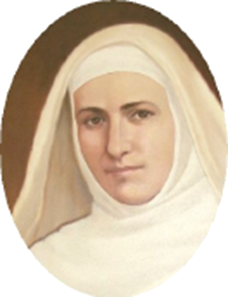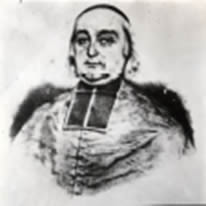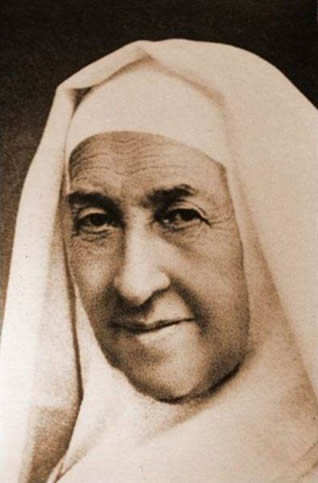FOUNDRESS AND SAINT: THE LIFE OF ST MARIE EUGENIE

The Congregation of the Religious of the Assumption, was founded in France by Saint Marie Eugénie Milleret to work for the transformation of society by the Gospel. The sisters are consecrated to God by vows and dedicated to the following of Jesus in contemplative and apostolic communities engaged in various works of education. Their contemplative life is nourished by personal and community prayer (the Divine Office), Adoration of the Blessed Sacrament and study. Their apostolic activity flows from their contemplative life.
Sometimes the Holy Spirit works in strange and fascinating ways. In the early 1800s, a French girl named Marie-Eugénie Milleret de Brou grew up in a family that had no interest in religion or Jesus Christ but was passionate about politics and social justice. They deplored the injustices of a class system and the misery brought on by the rise of industrialization. For them, however, there was no connection between these concerns and the Catholicism, the traditional religion of the people. They found hope in the cry of the French Revolution for liberty, equality and fraternity.
Although Eugénie relates that “Christ had no place in my education,” she made her First Holy Communion – probably by custom – and it was a great spiritual experience. She was totally “lost” in God and, when frightened at not seeing her mother and her place as she returned from Communion, she heard an interior voice: “You will lose your mother but I will be for you more than a mother. One day, you will leave everything to work for my Church which you do not yet know.” This event which gave the key to her future, was forgotten as life returned to “normal.”
Her father then sent Eugenie to live with very Catholic cousins in Paris. . During the next five years, “five lost years” according to Eugénie, she lived with her wealthy relatives and, while apparently enjoying everything, was interiorly tormented by her chosen interior solitude and questions about the meaning of life. She did not , however, lose her fervor for political and social questions nor her desire to do something good for others. Her father was eager to have her take her place in society like other women of her age by marrying. While, she had no real objection to marriage, she rejected all suitors.
Alone, far from her brother who had been her constant companion, Eugénie wondered about the meaning of life and love. She had lost everything except her fervor for social and political questions and the desire to do something good for others.

One day, her cousins invited her to the Notre Dame Cathedral to hear a Lenten sermon preached by a famous Dominican, Henri Lacordaire. He was known for his eloquence and influence with youth. His way of speaking of Christ and the Church made an impression on her and led to her conversion. She discovered that the ideals of justice and liberty, equality and fraternity are rooted in the Gospel of Jesus Christ who is the universal and definitive Liberator, and that “the Church possesses the secret of doing good here on earth.” While there will always be suffering and difficulties, “God wills to establish a social order in which no human would have to suffer from the oppression of any others.” Letter 1843.
Less than a year later, a priest in the confessional, Fr. Cambolot, recognizing that Marie Eugénie had intelligence and a passion that could make a difference in society, asked to see her. He convinced her that the religious life and education were her vocation.

Eugénie thought and prayed about the idea. It was her chance to say Yes to God just like Mary had when she was asked to be the Mother of Jesus. Eugénie knew she had to follow Jesus because she loved him. Eugénie prepared herself by study and prayer. She undertook the “reformation” of her intelligence by studying the Fathers of the Church, St. Thomas Aquinas and the great spiritual treasures of the Church. In 1839, at the age of 21, she founded the Religious of the Assumption with four other women. Her aim was to work for the coming of the Kingdom of God by helping people like herself to understand God’s loving plan for the world and to commit themselves to the cause of Christ. She wanted the Congregation to be rooted in Tradition yet open and able to respond to the needs, mentalities and questions of the age.

Marie Eugénie and the Sisters needed courage: they were young and inexperienced. She had to train the new sisters, find a house and start a school. Gradually more sisters joined her. They were very poor and their life was hard. They spent their time praying, teaching and being together as a community. It was so difficult that the Archbishop was worried that this life of poverty, prayer and education was too much for the sisters and they should not continue. However they assured him they were fine. Simultaneously, the Sisters were becoming known in Paris. Parents wanted to send their children to the school because the sisters were happy and sincere, as well as giving the pupils a broad, modern education.
Marie Eugénie’s life and her work spanned most of the nineteenth century and quickly spread internationally. She and the sisters taught that our faith in Jesus impels us to get involved in contemporary social issues and that all action should flow from a life of love and prayer.
The Foundress’ life spanned most of the 19th century. The Congregation grew quickly and today, Assumption communities labor in 33 countries in Europe, Africa, Asia and the Americas. Marie Eugénie Milleret was beatified in 1975 by Pope Paul VI.

